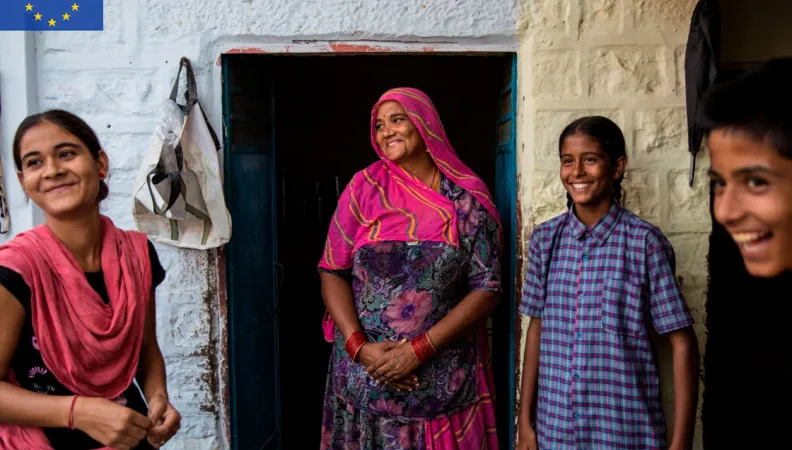Share the page
The distributional impact of social protection: short- and longer-run inequalities in Ethiopia, India and Peru

-
Project start date
-
2018Status
Completed
-
Project end date
-
2020
-
AFD financing amount
-
125 000
-
Location
-
Ethiopia, India, Peru
-
Research program
The project aims to establish the causal impact of three large-scale social-protection schemes in India, Ethiopia and Peru on both the level of economic resources and a number of dimensions of inequalities. The researchers involved in this project use a novel longitudinal dataset to carry out comparative analysis of these phenomena and draw conclusions that are relevant for other countries with similar circumstances.
Contexte
Social-protection schemes have become a popular form of intervention in developing countries both by governments and within the international-development community, as they are seen as a tool to combat the adverse impacts of natural and economic crises. However, the empirical evidence on the effectiveness of these programs remains mixed. Notwithstanding the wealth of interest from policy makers, donors, and researchers, there is a paucity of evidence about the distributional incidence of these programs. Existing work has often not been able to establish longer-run effects of public-works programs on poverty and inequality. In addition, there is a lack of focus on horizontal and spatial inequalities. This research project intends to fill this evidence gap.
This project is part of the first phase of the Research Facility on Inequalities, coordinated by AFD and funded by the European Commission's Directorate-General for International Partnerships over the 2017-2020 period. The first phase of the Facility has led to the conduct of 22 research projects and the publication of around 100 research papers and policy briefs.
Objectif
This research project proposes to investigate the distributional impact of three large-scale social-protection schemes - the Productive Safety Net Program (PSNP) in Ethiopia, the Mahatma Gandhi National Rural Employment Guarantee Scheme (NREGS) in India, and the Juntos conditional cash-transfer program in Peru. These programs were chosen because they are large-scale projects involving a coordinated effort by governments, donors, local authorities and individual households. The programs cover three countries with diverse social, cultural, political, and economic contexts from which to draw lessons for future policy initiatives.
The researchers propose to go beyond measuring the direct intended impacts of the programs and rather focus on their indirect, and not necessarily intended, consequences. In particular, they first consider the effect of these programs on the income and wealth of program participant households over both the shorter- and longer-run. They then turn to the programs’ impact on horizontal and spatial inequalities, as well as their effect on household social relations and the distribution of resources within households.
Méthode
Unlike traditional benefit-incidence studies, the researchers exploit policy differences across time and space, both within and across the countries, to provide causal estimates of the social-policy impacts. They use the Young Lives cohort study that collected data both pre-and post-program implementation between 2002 and 2014 in all three countries. They exploit a number of aspects of the Young Lives cohort study and the roll-out of the social-protection schemes in each country to produce estimates that deal with non-random program placement.
The researchers planned to begin by conducting an individual-specific pre- and post-program comparison of income and wealth. Then to exploit the staggered rollout of the social-protection programs across districts to causally identify the impact of the schemes on a set of indicators. They intend to compare changes in districts that received the program earlier to changes in districts that received the program later in a difference-in-differences approach. Last but not least, they will further assess the impact of the program on individual outcomes, taking advantage of administrative boundaries to separate treated and control areas in a geographic regression discontinuity.
Results
You may find the research papers here :
- Social protection and inequality: Evidence from Ethiopia, India and Peru
- Social protection and multidimensional poverty: Lessons from Ethiopia, India and Peru
- Social protection and intrahousehold resource allocation: Evidence from three large-scale programs
You may find the policy briefs here:
- Policy Dialogues No. 1 | Social Protection: The Impact on Inequality in Ethiopia, India, and Peru
- Policy Dialogues No. 2 | Social Protection: The Impact on Multidimensional Poverty in Ethiopia, India, and Peru
- Policy Dialogues No. 3 | Social protection: impact on household resource allocation and child undernutrition
Contact:
Conchita d’Ambrosio, Professor of Economics, Université du Luxembourg
Cecilia Poggi, Research Officer, AFD
